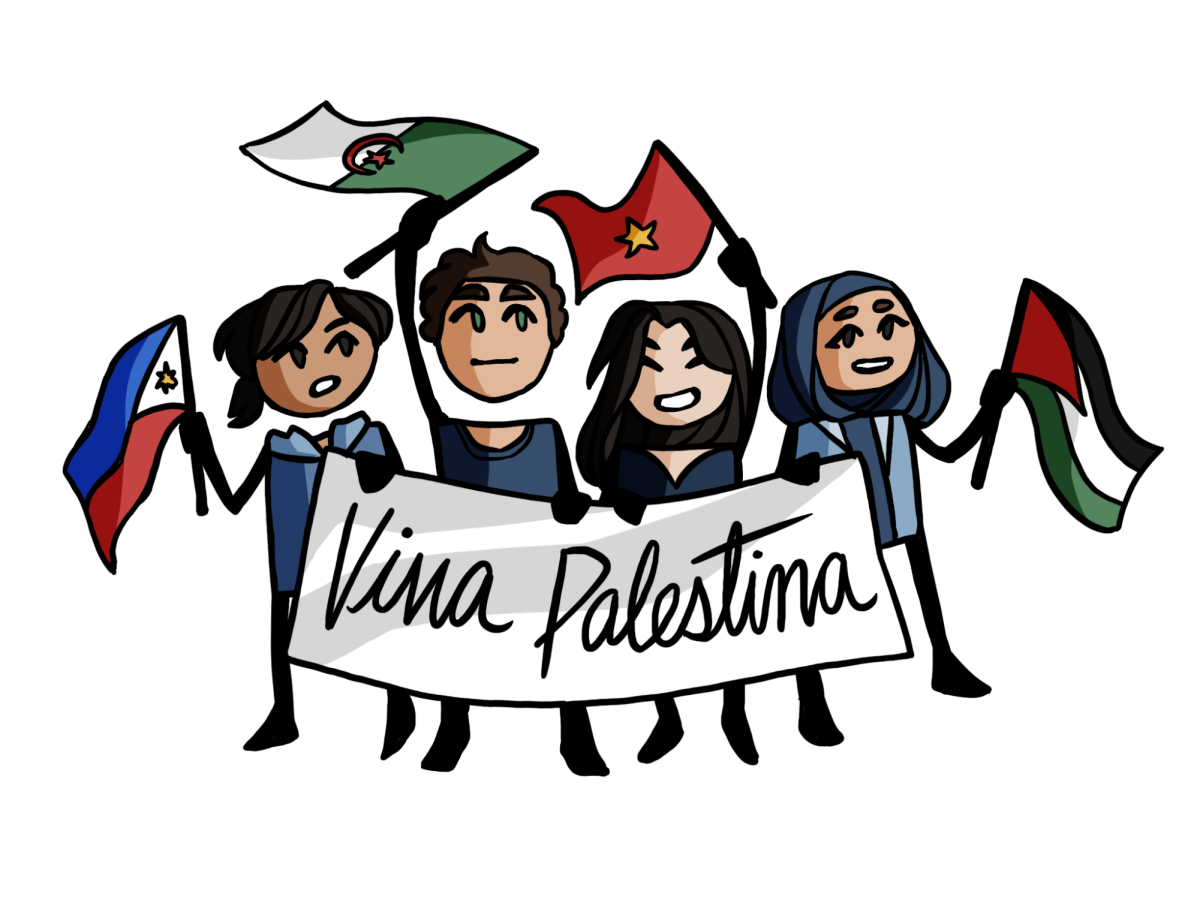In the Bay Area, home to diverse communities and social justice movements, chants ranging from “Viva Viva Palestina” to “From Palestine to the Philippines, stop the U.S. war machine” can be heard at protests. As more people talk about occupation in Palestine, SCHS students from various backgrounds find commonalities among each other.
The current occupation in Palestine has brought up many emotions from communities who have also experienced colonization, such as the Philippines. Senior Isaiah Placites feels a shared struggle between their community and the Palestinian community and is empowered by the large wave of Filipino support for Palestine.
“It was kind of heartwarming because I know that my people support Palestine,” Placites said.
Currently, two Bay Area cities, Oakland and Richmond, have passed resolutions for a ceasefire. Historically, the Bay Area has played a key role in social justice movements in the past, such as the Black Panther Party, which originated in Oakland, and the creation of the Ethnic Studies field at San Francisco State University.
According to Mission College history professor Hai Nguyen, the Bay Area’s education and diversity allows its people to question the status quo and look at foreign policy from a different lens.
“In the Bay Area, you have larger, more diverse communities,” Nguyen said. “And because of that, we have more empathy, but we also are more informed. If you look at our college education, we have this natural tendency to be like, ‘Wait, hold up. Don’t try to tell us what this is.’”
The Palestinian struggle goes back for generations, and for senior Noor Musleh, his grandparents had to flee Palestine due to the occupation. His family’s story is one filled with grief, loss and heartbreak, yet it is one felt by countless other Palestinians and communities who have lived under occupation.
“My grandparents migrated from Palestine to Jordan for the sake of a better life, but at the end of the day, they are Palestinian, and it’s heartbreaking to see their land like this,” Musleh said. “The people who were colonized definitely know what happened to their people, so seeing it happen now, they don’t want history to repeat itself.”
With the rise of Islamophobia and antisemitism following Oct. 7, Musleh urged his peers to separate the actions of individuals from their communities as he saw the impact Islamophobia had on his community following 9/11.
“We are seeing history repeat itself. Islamophobia is a real thing, and people are hating Muslim people just because of the actions of a few, equating it to every Muslim person in the world,” Musleh said.
Following 9/11, the Bush administration’s War on Terror led to wars such as the Iraq War from 2003-2011, in which 300,000 Iraqi civilians were killed. Recently, in a 2019 Pew Research Center survey, 62% of Americans believe the war was not worth fighting. Following the ongoing humanitarian crisis in Gaza, three-quarters of Democrats and half of Republicans support a ceasefire, according to Reuters.
As of Nov. 3, the House of Representatives approved $14.5 billion in aid for Israel. As the U.S. continues to support Israel, Nguyen is fearful of the impact this has on civilians in Gaza. Nguyen drew parallels between the Vietnam War and America’s involvement in the Middle East.
“Up until today, I look at the Vietnam War. I look at the death and the destruction that America had caused not only in Vietnam but in Cambodia, in Laos and Hmong people in particular,” Nguyen said. “Just because you have good intentions does not justify the means.”
During Palestine’s 75 years of occupation, Palestinians used both violent and nonviolent resistance in response to settler colonial practices. Nguyen noticed a pattern of people focusing solely on violence without questioning its impetus.
“The root cause of all of these struggles – whether it’s black communities, brown communities, Palestinian communities – the root cause of all of these struggles is that they have run out of nonviolent options,” Nguyen said. “What we’re doing is we are blaming the victims for their problems.”
Nguyen’s heart goes out for all civilians impacted and hopes that as people talk about the current events, they find shared experiences and build empathy with each other.
“I am not here to support what Hamas did,” Nguyen said. “We can support those (Israeli) families that were torn apart. You can be a Palestinian and have empathy for those Jewish families because that’s exactly what’s happening to people in Gaza right now. And so I hope that we crossed the lines and we understand the struggle of both sides. And we try to find more commonalities with each other.”



AYESHA KHAN • Dec 16, 2023 at 9:56 am
Very well written Khadeejah mashallah!